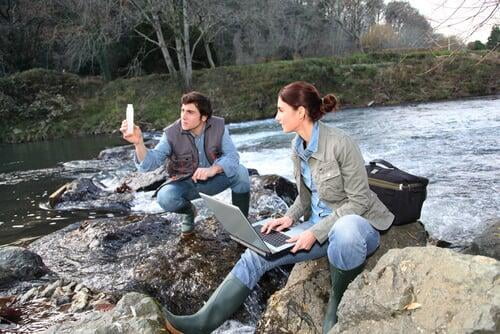Tiny Culprits — Introduction
Environmental Engineer
Environmental scientists and specialists use their knowledge of the natural sciences to protect the environment and human health. They may clean up polluted areas, advise policy makers, or work with industry to reduce waste.
Environmental scientists and specialists work in offices and laboratories. Some may spend time in the field gathering data and monitoring environmental conditions firsthand. Most environmental scientists and specialists work full time.
Employment of environmental scientists and specialists is projected to grow 15 percent from 2012 to 2022, faster than the average for all occupations. Heightened public interest in the hazards facing the environment, as well as the increasing demands placed on the environment by population growth, is expected to spur demand for environmental scientists and specialists.
Source: Bureau of Labor Statistics


Your Mission
Bacteria are the simplest organisms that are considered alive and they are EVERYWHERE. They are in the air, the soil, the water, and in and on all plants and animals. A single teaspoon of topsoil contains about a billion bacterial cells. The human mouth is home to more than 500 species of bacteria.
Without these huddled masses of the microbe world, other living things could not exist. Bacteria break down decaying materials, enriching the soil so new plants can grow. Bacteria in your intestines allow you to digest food. Bacteria are also used to produce life-saving medicines and to clean up oil spills.
Of course, not all bacteria are helpful. When lakes or drinking water become polluted with disease-causing bacteria, many organisms, including humans, suffer.
In this project, you are environmental scientists at the Centers for Disease Control and Prevention, known as the CDC. Your first assignment is to examine the conditions in a local freshwater lake. City officials assume there are bacteria in the lake, because people who come in contact with the water are suffering from illnesses. Your team must determine whether harmful bacteria are present in the lake, and if so, what kind of bacteria, their rate of growth, their size, and the potential hazard to the environment.
Once you finish studying the lake water, you will travel to a city in West Africa in the midst of an epidemic. Officials are worried that it might be cholera, an intestinal infection caused by ingestion of food or water contaminated with the bacterium V. cholerae. Cholera can cause death within hours if left untreated. It’s responsible for more than 100,000 deaths every year. Your investigations will help identify the tiny culprits and clean up the water, saving thousands of lives.

